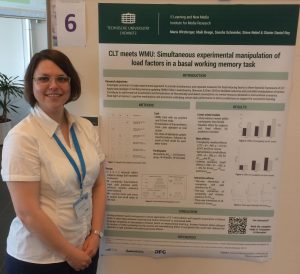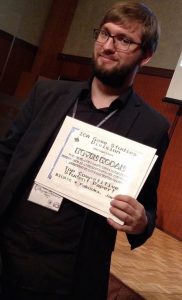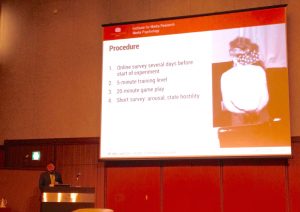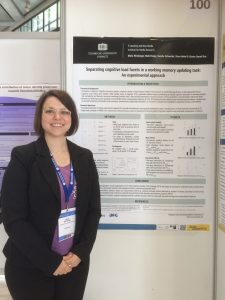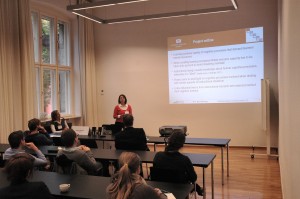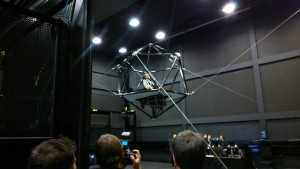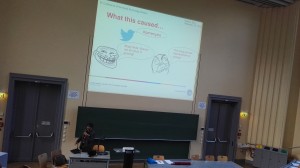This year’s International Conference on Web Engineering (ICWE) has been held from June 6th to June 9th at the USI Faculty of Informatics in Lugano, Switzerland. During the demo session on the first day of the conference, CrossWorlds researcher Markus Ast presented his demo on “Towards Handling Constraint Network Conditions between IoT Entities using Conflict-free Anti-entropy Communication”. Markus Ast also participated, together with Michael Krug, Fabian Wiedemann and Martin Gaedke, in the 2nd International Rapid Mashup Challenge. With the presentation of their work on “The SmartComposition Approach for Creating Environment-Aware Multi-Screen Mashups”, they were able to achieve the 1st place in this challenge.
CrossWorlds / Conferences
Conferences
This year, the annual International Cognitive Load Theory Conference (ICLTC) took place in Germany at the renowned Ruhr-University (RUB) in Bochum. Organized by the International Cognitive Load Theory Association (ICLTA), from June 22nd to 24th over 100 participants from Europe, Asia and the US spent three insightful days together to discuss research related to the often quoted and widely applied Cognitive Load Theory (CLT).
Within the poster session at the first conference day, CrossWorlds researcher Maria Wirzberger presented her poster “CLT meets WMU: Simultaneous experimental manipulation of load factors in a basal working memory task”, summarizing her recently published article in Computers & Education. She had the opportunity to enjoy promoting discussions and gain beneficial feedback on her work. The second conference day featured a session on “Gestures & Motion” in which CrossWorlds researcher Alexander Skulmowski provided insights into his research on “Embodied Cognitive Load Theory: costs, benefits and resources determine embodied learning outcomes”. His approach was well-received within the community.
Taken together, our colleagues spent three exciting days filled with amazing talks and lively discussions!
We are proud to announce that CrossWorlds collegiate Kevin Koban won the Best Student Paper Award of the Game Studies Division at this year’s ICA Conference in Fukuoka with his work on problematic video gaming titled “I hate it, but I can’t stop. Addictive tendencies as a mediator for negative game experience in a mobile trivia game”.
Conducted together with his supervisor Peter Ohler, the paper emphasized a meaningful, but often neglected differentiation between video game enthusiasm and problematic gaming tendencies with regard to players’ individual dispositions, gaming motivations as well as positive and negative experience while and immediately after a gaming episode. In this context, the study’s sample contained both casual and hardcore gamers of the mobile trivia game QuizClash including 140 of the top 1000 players from Germany, Austria, and Switzerland.
If you want to take a look into the results, the presentation slides can be downloaded here.
Late spring, as every year, marks an academic highlight in media research as the Annual Conference of the International Communication Association (ICA) invites thousands of scholars from all over the world to discuss their latest research. To seize this opportunity, CrossWorlds members Daniel Pietschmann, Benny Liebold, Kevin Koban, and Jan-Philipp Stein as well as associated member Nicholas H. Mueller went far east to Japan to participate in pre-conferences in Kyoto and Tokyo and, finally, to present a total of seven research papers at the main conference in Fukuoka.
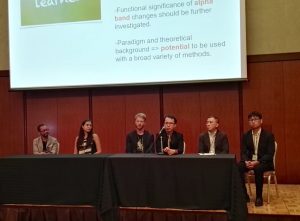 The presented papers covered a broad range of topics including novelty and learning effects of naturally mapped video game controllers (Benny Liebold and Daniel Pietschmann together with Nick Bowman from West Virginia University), psychophysiological foundations of breaks in presence (Benny Liebold, Daniel Pietschmann and Peter Ohler in collaboration with colleagues from the University of Wuerzburg, Michael Brill and Frank Schwab), recreational media use (Kevin Koban together with associated member Georg Valtin and research student Sandra Rogenz), or suspense in cliffhanger situations (Nicholas H. Mueller).
The presented papers covered a broad range of topics including novelty and learning effects of naturally mapped video game controllers (Benny Liebold and Daniel Pietschmann together with Nick Bowman from West Virginia University), psychophysiological foundations of breaks in presence (Benny Liebold, Daniel Pietschmann and Peter Ohler in collaboration with colleagues from the University of Wuerzburg, Michael Brill and Frank Schwab), recreational media use (Kevin Koban together with associated member Georg Valtin and research student Sandra Rogenz), or suspense in cliffhanger situations (Nicholas H. Mueller).
Alongside, the CrossWorlds group was busy extending their research networks and even building collaborations. This might yield some interesting results in the not too distant future.
From May 5th to 8th, the second International Meeting of the Psychonomic Society took place in the marvellous scenery of Granada. Over 1000 researchers from all over the world got together to discuss topics related to human cognition. Besides of talks and keynotes from outstanding experts, the organizers offered a sophisticated selection of social events: a Flamenco show, a nightly visit to the impressing and culturally rich Alhambra and a dinner in the beautiful Alhambra Gardens. At the first day, prior to the conference beginning, a meeting organized by Women in Cognitive Science (WiCS) supplemented the conference with insights into the important topic of international collaborations.
During one of the poster sessions, CrossWorlds researcher Maria Wirzberger presented her work on “Separating cognitive load facets in a working memory updating task: An experimental approach” that raised broad interest amongst fellow scientists. As additional benefit, she could promote her recently published article in Computers & Education, doi:10.1016/j.compedu.2016.04.010, which relates to the introduced study.
Due to the rich feedback, vibrant discussions and various opportunities to enhance her professional network, the conference has been a really valuable platform for our young researcher!
From March 21st to 23rd the 58th Conference of Experimental Psychologists (TeaP) took place in the marvelous city of Heidelberg. A group of media researchers from CrossWorlds and the affiliated Chair of E-Learning and New Media participated as well and presented their work during the conference.
Right at the first day, Maria Wirzberger gave a talk on modeling load-inducing factors in instructional design within her organized symposium on enhancing experimental research with the cognitive architecture ACT-R, in which she had invited speakers from Heidelberg and Berlin as well. On the second day, within a session on multimedia learning Steve Nebel talked about the jigsaw principle in educational videogames, Sascha Schneider presented his research on politeness in multimedia instructions as facilitator of learning and motivation and Maik Beege introduced his work on the effect of addressing in multimedia learning. Furthermore, master’s degree student Laura Winkler together with her supervisor Kevin Koban presented her bachelor’s thesis on attractiveness priming in one of the exceptionally well-attended poster sessions. During the third day, Alexander Skulmowski gave his talk regarding impacts of physical demands on cognitive resource allocation in a session related to the field of embodiment.
We had a great time in Heidelberg with a lot of exciting talks and discussions! Moreover, we could enjoy vibrant conversations with our fellows from various locations and research areas and thereby enhance our professional networks.
From October 7th to 9th, the 11th Berlin Human-Machine Workshop took place in the beautiful historic builiding of the Berlin-Brandenburg Academy of Sciences and Humanities. It comprised a variety of talks and posters from different areas of research related to human-machine interaction, and offered exhibitiors the opportunity to present the latest developments in physiological measurement to an interested audience.
Within the conference, CrossWorlds member Maria Wirzberger introduced her PhD project in her talk “Cognitive modeling meets instructional design: Exploring Cognitive Load Theory with ACT-R”. The arising discussions with colleagues from various fields provided valuable feedback in further developing her approach. Besides that, interesting contacts were built and cooperations got started as well.
Just one week after the conference of the Media Psychology Division, Tübingen hosted this year’s Driving Simulation Conference. Organized by the Max Planck Institute for Biological Cybernetics (amongst others), the conference focused on current issues and achievements in simulated driving.
In addition to listening to a variety of excellent talks, several driving simulator facilities were visited, including the new CableRobot Simulator created by the Max Planck Institute. Its developers were eager to answer all arising questions leading to fruitful discussions and new contacts.
On September 8, 2015, CrossWorlds member Alexander Skulmowski attended the symposium Embodied Cognition in Multimedia Learning in Rotterdam. The symposium was organized by researchers from Radboud University and Erasmus University Rotterdam. Alexander presented his poster entitled “Embodied Cognitive Load Theory: Introducing a cost-benefit model for embodied interactions.”
The symposium featured a variety of talks related to the role of gestures, animations and other embodiment aspects on learning, among others by Arthur Glenberg. In addition to the talks and posters, demos of gesture-based interactions were presented.
The 9th conference of the Media Psychology Division of the DGPS was held at Eberhard Karls Universität Tübingen at the Knowledge Media Research Center. The bi-annual conference is usually attended by mostly German media psychology scholars and researchers, but as in 2013, this year’s conference was an international event with presenters from all over the world.
CrossWorlds members and research students presented their work in Tübingen as well: Alexander Skulmowski presented his paper “Moral decision-making in virtual reality settings – An eye-tracking and pupillometry study”.
Alexander also presented a research poster with master’s student Yannik Augustin titled “A temporal model of aesthetic web site perception”. Research student Dominik Hemeli also presented work with the E-Learning Group with his poster “Mining learning and crafting scientific experiments: The use of Minecraft in education and research and what can be learned from its success for the future of educational videogames”.
Kevin Koban and Benny Liebold also presented their work in a talk titled “Newbies, Start Your Engines. Virtual Motor Skill Training and True Transfer”.
